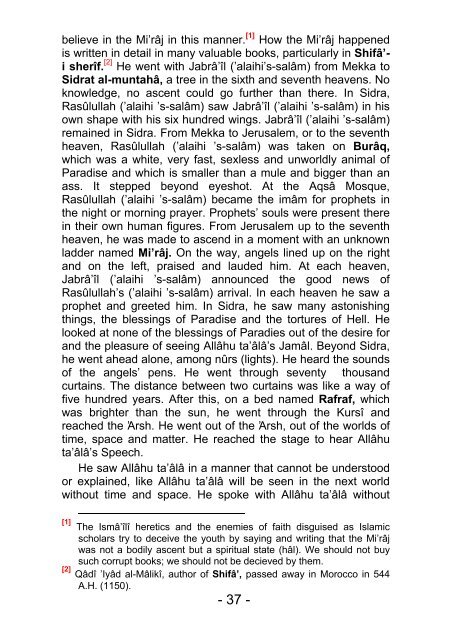8-Belief and Islam - Hakikat Kitabevi
8-Belief and Islam - Hakikat Kitabevi
8-Belief and Islam - Hakikat Kitabevi
Create successful ePaper yourself
Turn your PDF publications into a flip-book with our unique Google optimized e-Paper software.
elieve in the Mi’râj in this manner. [1] How the Mi’râj happened<br />
is written in detail in many valuable books, particularly in Shifâ’i<br />
sherîf. [2] He went with Jabrâ’îl (’alaihi’s-salâm) from Mekka to<br />
Sidrat al-muntahâ, a tree in the sixth <strong>and</strong> seventh heavens. No<br />
knowledge, no ascent could go further than there. In Sidra,<br />
Rasûlullah (’alaihi ’s-salâm) saw Jabrâ’îl (’alaihi ’s-salâm) in his<br />
own shape with his six hundred wings. Jabrâ’îl (’alaihi ’s-salâm)<br />
remained in Sidra. From Mekka to Jerusalem, or to the seventh<br />
heaven, Rasûlullah (’alaihi ’s-salâm) was taken on Burâq,<br />
which was a white, very fast, sexless <strong>and</strong> unworldly animal of<br />
Paradise <strong>and</strong> which is smaller than a mule <strong>and</strong> bigger than an<br />
ass. It stepped beyond eyeshot. At the Aqsâ Mosque,<br />
Rasûlullah (’alaihi ’s-salâm) became the imâm for prophets in<br />
the night or morning prayer. Prophets’ souls were present there<br />
in their own human figures. From Jerusalem up to the seventh<br />
heaven, he was made to ascend in a moment with an unknown<br />
ladder named Mi’râj. On the way, angels lined up on the right<br />
<strong>and</strong> on the left, praised <strong>and</strong> lauded him. At each heaven,<br />
Jabrâ’îl (’alaihi ’s-salâm) announced the good news of<br />
Rasûlullah’s (’alaihi ’s-salâm) arrival. In each heaven he saw a<br />
prophet <strong>and</strong> greeted him. In Sidra, he saw many astonishing<br />
things, the blessings of Paradise <strong>and</strong> the tortures of Hell. He<br />
looked at none of the blessings of Paradies out of the desire for<br />
<strong>and</strong> the pleasure of seeing Allâhu ta’âlâ’s Jamâl. Beyond Sidra,<br />
he went ahead alone, among nûrs (lights). He heard the sounds<br />
of the angels’ pens. He went through seventy thous<strong>and</strong><br />
curtains. The distance between two curtains was like a way of<br />
five hundred years. After this, on a bed named Rafraf, which<br />
was brighter than the sun, he went through the Kursî <strong>and</strong><br />
reached the ’Arsh. He went out of the ’Arsh, out of the worlds of<br />
time, space <strong>and</strong> matter. He reached the stage to hear Allâhu<br />
ta’âlâ’s Speech.<br />
He saw Allâhu ta’âlâ in a manner that cannot be understood<br />
or explained, like Allâhu ta’âlâ will be seen in the next world<br />
without time <strong>and</strong> space. He spoke with Allâhu ta’âlâ without<br />
[1] The Ismâ’îlî heretics <strong>and</strong> the enemies of faith disguised as <strong>Islam</strong>ic<br />
scholars try to deceive the youth by saying <strong>and</strong> writing that the Mi’râj<br />
was not a bodily ascent but a spiritual state (hâl). We should not buy<br />
such corrupt books; we should not be decieved by them.<br />
[2] Qâdî ’Iyâd al-Mâlikî, author of Shifâ’, passed away in Morocco in 544<br />
A.H. (1150).<br />
- 37 -











